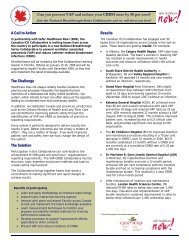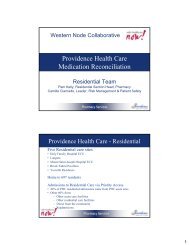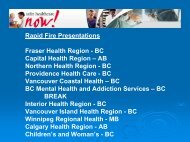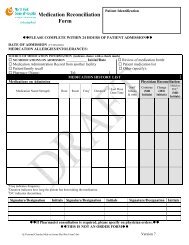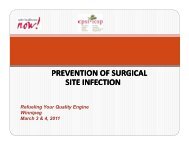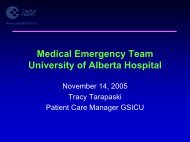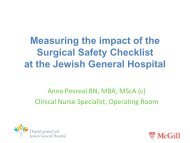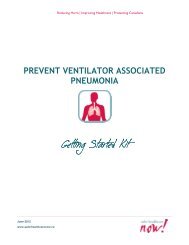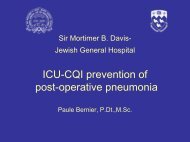Medication Reconciliation in Canada: Raising the Bar (2012) - CIHI
Medication Reconciliation in Canada: Raising the Bar (2012) - CIHI
Medication Reconciliation in Canada: Raising the Bar (2012) - CIHI
- No tags were found...
You also want an ePaper? Increase the reach of your titles
YUMPU automatically turns print PDFs into web optimized ePapers that Google loves.
• Cont<strong>in</strong>u<strong>in</strong>g collaboration with professional associations and national partners to create acomprehensive communication strategy to support medication reconciliation efforts <strong>in</strong> <strong>Canada</strong>.This strategy will target health care providers; prov<strong>in</strong>cial, territorial, and federal health m<strong>in</strong>istries;and <strong>the</strong> public.Look<strong>in</strong>g Ahead: <strong>Medication</strong> <strong>Reconciliation</strong> for All<strong>Medication</strong> reconciliation cont<strong>in</strong>ues to be a complex and challeng<strong>in</strong>g component of patient safetyfor health care organizations across <strong>Canada</strong>. Committed and visible leadership is required forsystem-wide implementation and spread of this key patient safety priority. The partnership betweenAccreditation <strong>Canada</strong>, <strong>the</strong> Canadian Institute for Health Information, <strong>the</strong> Canadian Patient SafetyInstitute, and <strong>the</strong> Institute for Safe <strong>Medication</strong> Practices <strong>Canada</strong> will cont<strong>in</strong>ue to provide leadership,comparable data and <strong>in</strong>formation on best practices, and ongo<strong>in</strong>g support to make care safer forall Canadians. This collaboration will advance <strong>the</strong> national medication reconciliation agenda andfoster improvements <strong>in</strong> <strong>the</strong> communication of medication <strong>in</strong>formation with<strong>in</strong> <strong>the</strong> health care system,promote consistent measurement, and ensure tools are cont<strong>in</strong>ually reviewed and updated to supportthis important work.The end goal – implementation of medication reconciliation across <strong>the</strong> Canadian health system – isatta<strong>in</strong>able. Health care organizations that have successfully implemented medication reconciliationhave an overwhelm<strong>in</strong>g sense that medication reconciliation benefits patients, is <strong>the</strong> right th<strong>in</strong>g todo, and makes care safer. This essential communication – to collect and share comprehensivemedication <strong>in</strong>formation – must <strong>in</strong>volve cl<strong>in</strong>icians work<strong>in</strong>g with patients and families (to educate andpromote self-management), o<strong>the</strong>r health care providers, and unwaver<strong>in</strong>g support from health careleaders. Communicat<strong>in</strong>g effectively about medications is a critical component of deliver<strong>in</strong>g safehigh-quality care across all sectors of <strong>the</strong> Canadian health care system.18 <strong>Medication</strong> <strong>Reconciliation</strong> <strong>in</strong> <strong>Canada</strong>: Rais<strong>in</strong>g <strong>the</strong> <strong>Bar</strong>



